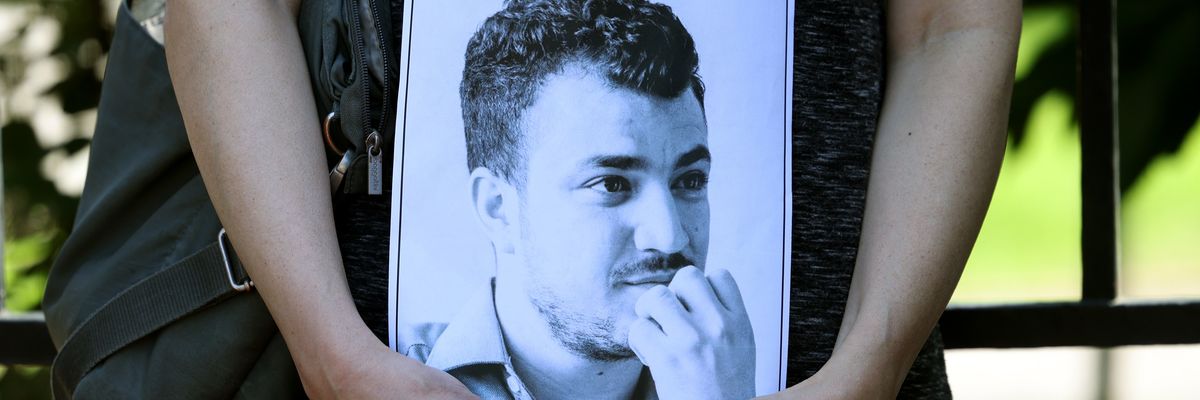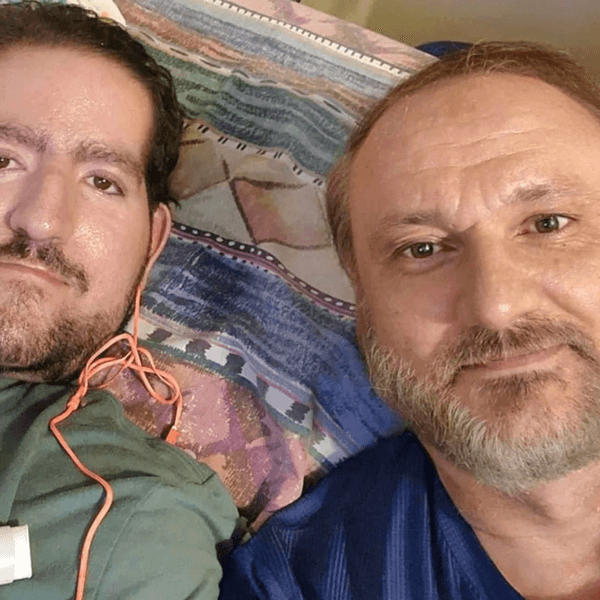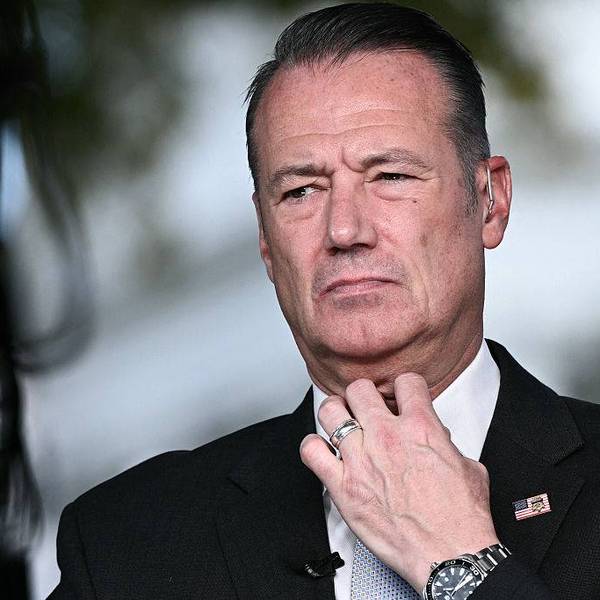
A protester holds an image of Mahmoud Khalil, a graduate student and organizer at Columbia, at Harvard University in Cambridge, Massachusetts on May 12, 2025.
After 'Heartless' ICE Refusal, Judge Orders Officials to Allow Mahmoud Khalil to See His Family
ICE and a private prison contractor had cited alleged "security concerns" when they refused to allow Khalil see his wife and newborn son.
U.S. District Judge Michael Farbiarz in New Jersey ruled Wednesday that immigration officials at a Louisiana detention facility must allow former Columbia University student organizer Mahmoud Khalil to see his family, after the authorities refused to grant Khalil's request on their own.
Farbiarz found, based on a court filing by Khalil's lawyers, that his wife, Noor Abdalla "is aware of certain facts that would be of assistance to counsel in their current habeas representation of the petitioner before this court."
"The court is inclined to issue an order today... to permit the petitioner, his wife, and the petitioner's lawyers to meet together tomorrow morning at the facility where the petitioner is held," Farbiarz wrote.
Khalil is scheduled to have an immigration hearing Thursday, which Abdalla and her newborn son flew to Louisiana from New York to attend.
The order did not state that a visit specifically for Khalil to spend time with his wife and son should be arranged.
Lawyers with the Center for Constitutional Rights, the ACLU, and other groups helping to represent Khalil in his habeas corpus case had submitted a filing with Farbiarz Wednesday, asking him to require LaSalle Detention Center in Jena, Louisiana to allow Khalil to visit with his family for at least two hours—exactly a month after Immigration and Customs Enforcement (ICE) refused to allow him to be present for his son's birth—or "at minimum," allow Abdalla to join a contact visit with Khalil's legal team.
"Petitioner's counsel have made repeated requests for a contact visit to occur," wrote the lawyers. "Such a visit is necessary for the most elementary human reasons and given the ongoing strain of his pending habeas corpus petition, the visit is critical to ensure Mr. Khalil, who is an active participant in his legal case, can meaningfully contribute to the proceedings before this court."
The request was rejected on Wednesday morning after Abdalla and her baby had flown more than 1,400 miles for the hearing.
Along with the private prison contractor that runs the facility, GEO Group, ICE had cited "security concerns" when refusing to allow Khalil to see his family.
"The facility's refusal contradicts ICE's own directives, including ICE Directive 11064.3, which affirms the importance of minimizing disruptions to family life and preserving parental rights," said the ACLU in a statement. "The Performance-Based National Detention Standards also explicitly encourage contact visits, especially where young children and long travel distances are involved."
Abdalla said she was "furious at the cruelty and inhumanity of this system that dares to call itself just."
"After flying over a thousand miles to Louisiana with our newborn son, his very first flight, all so his father could finally hold him in his arms, ICE has denied us even this most basic human right," said Abdalla. "This is not just heartless. It is deliberate violence, the calculated cruelty of a government that tears families apart without remorse. And I cannot ignore the echoes of this pain in the stories of Palestinian families, torn apart by Israeli military prisons and bombs, denied dignity, denied life. Our struggle is not isolated. This system is unjust, and we will fight until Mahmoud is home."
Abdalla, a U.S. citizen, was eight months pregnant when immigration agents accosted her and Khalil in March outside their apartment on Columbia's campus and took him away in an unmarked vehicle. He was informed that his green card had been revoked and was taken first to a detention center in New Jersey and then flown to Louisiana, where an immigration judge later ruled that the Trump administration's deportation case against him could go forward. That ruling was handed down despite Secretary of State Marco Rubio's admission that Khalil is not accused of breaking any laws and that he was targeted because his advocacy for Palestinian rights was seen as detrimental to U.S. foreign policy interests.
"The government chose to arrest and detain Mahmoud thousands of miles away in the Louisiana detention gulags to punish him for his support for Palestinian human rights, and is doubling down on their retaliatory punishment by denying him the most elementary human contact with his wife and child," said Baher Azmy, legal director of the Center for Constitutional Rights. "ICE leadership and elected officials must act to remedy this grotesque and unnecessary inhumanity for Mahmoud—and for all others."
An Urgent Message From Our Co-Founder
Dear Common Dreams reader, The U.S. is on a fast track to authoritarianism like nothing I've ever seen. Meanwhile, corporate news outlets are utterly capitulating to Trump, twisting their coverage to avoid drawing his ire while lining up to stuff cash in his pockets. That's why I believe that Common Dreams is doing the best and most consequential reporting that we've ever done. Our small but mighty team is a progressive reporting powerhouse, covering the news every day that the corporate media never will. Our mission has always been simple: To inform. To inspire. And to ignite change for the common good. Now here's the key piece that I want all our readers to understand: None of this would be possible without your financial support. That's not just some fundraising cliche. It's the absolute and literal truth. We don't accept corporate advertising and never will. We don't have a paywall because we don't think people should be blocked from critical news based on their ability to pay. Everything we do is funded by the donations of readers like you. Will you donate now to help power the nonprofit, independent reporting of Common Dreams? Thank you for being a vital member of our community. Together, we can keep independent journalism alive when it’s needed most. - Craig Brown, Co-founder |
U.S. District Judge Michael Farbiarz in New Jersey ruled Wednesday that immigration officials at a Louisiana detention facility must allow former Columbia University student organizer Mahmoud Khalil to see his family, after the authorities refused to grant Khalil's request on their own.
Farbiarz found, based on a court filing by Khalil's lawyers, that his wife, Noor Abdalla "is aware of certain facts that would be of assistance to counsel in their current habeas representation of the petitioner before this court."
"The court is inclined to issue an order today... to permit the petitioner, his wife, and the petitioner's lawyers to meet together tomorrow morning at the facility where the petitioner is held," Farbiarz wrote.
Khalil is scheduled to have an immigration hearing Thursday, which Abdalla and her newborn son flew to Louisiana from New York to attend.
The order did not state that a visit specifically for Khalil to spend time with his wife and son should be arranged.
Lawyers with the Center for Constitutional Rights, the ACLU, and other groups helping to represent Khalil in his habeas corpus case had submitted a filing with Farbiarz Wednesday, asking him to require LaSalle Detention Center in Jena, Louisiana to allow Khalil to visit with his family for at least two hours—exactly a month after Immigration and Customs Enforcement (ICE) refused to allow him to be present for his son's birth—or "at minimum," allow Abdalla to join a contact visit with Khalil's legal team.
"Petitioner's counsel have made repeated requests for a contact visit to occur," wrote the lawyers. "Such a visit is necessary for the most elementary human reasons and given the ongoing strain of his pending habeas corpus petition, the visit is critical to ensure Mr. Khalil, who is an active participant in his legal case, can meaningfully contribute to the proceedings before this court."
The request was rejected on Wednesday morning after Abdalla and her baby had flown more than 1,400 miles for the hearing.
Along with the private prison contractor that runs the facility, GEO Group, ICE had cited "security concerns" when refusing to allow Khalil to see his family.
"The facility's refusal contradicts ICE's own directives, including ICE Directive 11064.3, which affirms the importance of minimizing disruptions to family life and preserving parental rights," said the ACLU in a statement. "The Performance-Based National Detention Standards also explicitly encourage contact visits, especially where young children and long travel distances are involved."
Abdalla said she was "furious at the cruelty and inhumanity of this system that dares to call itself just."
"After flying over a thousand miles to Louisiana with our newborn son, his very first flight, all so his father could finally hold him in his arms, ICE has denied us even this most basic human right," said Abdalla. "This is not just heartless. It is deliberate violence, the calculated cruelty of a government that tears families apart without remorse. And I cannot ignore the echoes of this pain in the stories of Palestinian families, torn apart by Israeli military prisons and bombs, denied dignity, denied life. Our struggle is not isolated. This system is unjust, and we will fight until Mahmoud is home."
Abdalla, a U.S. citizen, was eight months pregnant when immigration agents accosted her and Khalil in March outside their apartment on Columbia's campus and took him away in an unmarked vehicle. He was informed that his green card had been revoked and was taken first to a detention center in New Jersey and then flown to Louisiana, where an immigration judge later ruled that the Trump administration's deportation case against him could go forward. That ruling was handed down despite Secretary of State Marco Rubio's admission that Khalil is not accused of breaking any laws and that he was targeted because his advocacy for Palestinian rights was seen as detrimental to U.S. foreign policy interests.
"The government chose to arrest and detain Mahmoud thousands of miles away in the Louisiana detention gulags to punish him for his support for Palestinian human rights, and is doubling down on their retaliatory punishment by denying him the most elementary human contact with his wife and child," said Baher Azmy, legal director of the Center for Constitutional Rights. "ICE leadership and elected officials must act to remedy this grotesque and unnecessary inhumanity for Mahmoud—and for all others."
- After Giving Birth, Khalil's Wife Says Trump and ICE 'Have Stolen These Precious Moments' ›
- An Open Letter to Mahmoud Khalil and Noor Abdalla’s Newborn Child ›
- Democracy for Some 'Is No Democracy at All,' Writes Mahmoud Khalil From ICE Detention ›
- Judge Rules Trump Admin's Detention of Mahmoud Khalil 'Likely' Unconstitutional | Common Dreams ›
- Federal Judge Orders Release of Palestine Defender Mahmoud Khalil | Common Dreams ›
- Jayapal Slams ICE for Targeting Law-Abiding 'Moms, Dads, Grandparents'—Not Criminals | Common Dreams ›
U.S. District Judge Michael Farbiarz in New Jersey ruled Wednesday that immigration officials at a Louisiana detention facility must allow former Columbia University student organizer Mahmoud Khalil to see his family, after the authorities refused to grant Khalil's request on their own.
Farbiarz found, based on a court filing by Khalil's lawyers, that his wife, Noor Abdalla "is aware of certain facts that would be of assistance to counsel in their current habeas representation of the petitioner before this court."
"The court is inclined to issue an order today... to permit the petitioner, his wife, and the petitioner's lawyers to meet together tomorrow morning at the facility where the petitioner is held," Farbiarz wrote.
Khalil is scheduled to have an immigration hearing Thursday, which Abdalla and her newborn son flew to Louisiana from New York to attend.
The order did not state that a visit specifically for Khalil to spend time with his wife and son should be arranged.
Lawyers with the Center for Constitutional Rights, the ACLU, and other groups helping to represent Khalil in his habeas corpus case had submitted a filing with Farbiarz Wednesday, asking him to require LaSalle Detention Center in Jena, Louisiana to allow Khalil to visit with his family for at least two hours—exactly a month after Immigration and Customs Enforcement (ICE) refused to allow him to be present for his son's birth—or "at minimum," allow Abdalla to join a contact visit with Khalil's legal team.
"Petitioner's counsel have made repeated requests for a contact visit to occur," wrote the lawyers. "Such a visit is necessary for the most elementary human reasons and given the ongoing strain of his pending habeas corpus petition, the visit is critical to ensure Mr. Khalil, who is an active participant in his legal case, can meaningfully contribute to the proceedings before this court."
The request was rejected on Wednesday morning after Abdalla and her baby had flown more than 1,400 miles for the hearing.
Along with the private prison contractor that runs the facility, GEO Group, ICE had cited "security concerns" when refusing to allow Khalil to see his family.
"The facility's refusal contradicts ICE's own directives, including ICE Directive 11064.3, which affirms the importance of minimizing disruptions to family life and preserving parental rights," said the ACLU in a statement. "The Performance-Based National Detention Standards also explicitly encourage contact visits, especially where young children and long travel distances are involved."
Abdalla said she was "furious at the cruelty and inhumanity of this system that dares to call itself just."
"After flying over a thousand miles to Louisiana with our newborn son, his very first flight, all so his father could finally hold him in his arms, ICE has denied us even this most basic human right," said Abdalla. "This is not just heartless. It is deliberate violence, the calculated cruelty of a government that tears families apart without remorse. And I cannot ignore the echoes of this pain in the stories of Palestinian families, torn apart by Israeli military prisons and bombs, denied dignity, denied life. Our struggle is not isolated. This system is unjust, and we will fight until Mahmoud is home."
Abdalla, a U.S. citizen, was eight months pregnant when immigration agents accosted her and Khalil in March outside their apartment on Columbia's campus and took him away in an unmarked vehicle. He was informed that his green card had been revoked and was taken first to a detention center in New Jersey and then flown to Louisiana, where an immigration judge later ruled that the Trump administration's deportation case against him could go forward. That ruling was handed down despite Secretary of State Marco Rubio's admission that Khalil is not accused of breaking any laws and that he was targeted because his advocacy for Palestinian rights was seen as detrimental to U.S. foreign policy interests.
"The government chose to arrest and detain Mahmoud thousands of miles away in the Louisiana detention gulags to punish him for his support for Palestinian human rights, and is doubling down on their retaliatory punishment by denying him the most elementary human contact with his wife and child," said Baher Azmy, legal director of the Center for Constitutional Rights. "ICE leadership and elected officials must act to remedy this grotesque and unnecessary inhumanity for Mahmoud—and for all others."
- After Giving Birth, Khalil's Wife Says Trump and ICE 'Have Stolen These Precious Moments' ›
- An Open Letter to Mahmoud Khalil and Noor Abdalla’s Newborn Child ›
- Democracy for Some 'Is No Democracy at All,' Writes Mahmoud Khalil From ICE Detention ›
- Judge Rules Trump Admin's Detention of Mahmoud Khalil 'Likely' Unconstitutional | Common Dreams ›
- Federal Judge Orders Release of Palestine Defender Mahmoud Khalil | Common Dreams ›
- Jayapal Slams ICE for Targeting Law-Abiding 'Moms, Dads, Grandparents'—Not Criminals | Common Dreams ›

